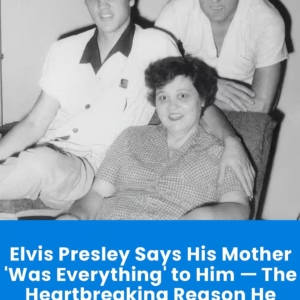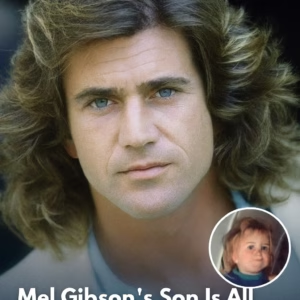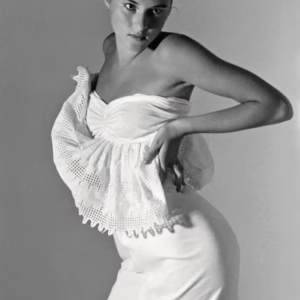It began as an ordinary morning—quiet, gray, and filled with the kind of melancholy that lingers long after loss. I had gone to the cemetery, as I often did, to visit my father’s grave. Six months had passed since his death, yet the pain still sat heavy in my chest. I stood beneath the towering oaks, the scent of damp soil in the air, and whispered my usual goodbye. “I miss you, Dad.”
As I turned to leave, I noticed a frail woman standing alone near a freshly dug grave. She was elderly, blind, dressed in a black dress too thin for the morning chill, her white cane trembling slightly in her grip. She looked lost—abandoned even.
“Excuse me,” I said gently. “Do you need help?”
She turned toward my voice, her lips curling into a faint, grateful smile. “Oh, thank you, dear. My sons were supposed to pick me up, but I think they’ve forgotten.”
The words struck a nerve. What kind of sons leave their blind mother alone in a cemetery? “I can walk you home,” I offered.
She introduced herself as Kira. Her husband, Samuel, had passed away only a week earlier. “He was my world,” she said, her voice trembling. “Forty-two years of marriage. Now I don’t know how to live without him.”
We walked slowly through quiet streets lined with winter-bare trees. I listened as she spoke of Samuel, of their garden, their travels, and of the two sons who rarely visited unless they needed money. “They said they’d come back for me,” she murmured. “But I waited two hours. Samuel always said they’d be the death of me.”
Her words held both bitterness and heartbreak. When we reached her modest brick home surrounded by roses, she smiled shyly. “Would you come in for tea? It’s the least I can do.”
I hesitated, but there was a loneliness about her that I couldn’t ignore. Inside, the house smelled of old books and rosewater. The walls were lined with photographs—Kira and her husband in their youth, beaming before the Eiffel Tower, hands clasped as though they’d never let go.
As she brewed tea, she spoke about her husband’s meticulousness. “Samuel installed cameras everywhere,” she said with a faint chuckle. “He never trusted anyone, not even the boys. He said they were too interested in what’s mine.”
The comment unsettled me, but I brushed it aside. I stayed for an hour, listening to her stories, before heading home. She thanked me profusely and asked if I’d visit again. I promised I would.
The next morning, I woke to pounding on my front door. Groggy and confused, I opened it to find two furious men flanked by a police officer.
“That’s her!” the older man barked. “She was at our mother’s house yesterday!”
The officer looked at me evenly. “Ma’am, are you acquainted with a woman named Kira?”
“Yes,” I said, my stomach tightening. “I walked her home from the cemetery yesterday.”
The younger man stepped forward, his face red with anger. “And then you robbed her blind, didn’t you?”
“What?” I stammered. “No, I didn’t take anything!”
Their accusations came rapid-fire—money gone, jewelry missing, me being the only stranger in the house. The officer asked me to come to the station to “clear things up.” My hands shook as I grabbed my coat, terrified and bewildered.
When we arrived, Kira was already there, sitting calmly in a corner with her cane. Her face brightened when she saw me. “Oh, thank heavens,” she said. “I told them you didn’t do it.”
“Then why am I here?” I asked, glancing at the officers.
“Because my sons can’t tell truth from greed,” she said flatly. “Officer, didn’t I mention the cameras?”
The older son blanched. “Mom, please—”
But Kira raised her chin. “No. Samuel installed cameras throughout the house—living room, kitchen, hallways. Check them. They’ll tell you who took my things.”
The officers exchanged looks, then dispatched a team to retrieve the footage. The room fell silent except for the ticking clock. Kira sat unmoving, hands folded neatly in her lap. Her sons avoided her gaze.
An hour later, the officers returned with a laptop. “We’ve reviewed the footage,” one said grimly.
Everyone leaned in as the video began. There I was, helping Kira to the couch, making tea, chatting for a while, and leaving. Nothing suspicious. I felt relief flood through me—until the next part played.
Minutes after I’d left, Ethan and Mark—her sons—entered the frame. They rifled through drawers, pried open a jewelry box, and pulled cash from a cookie jar. One even laughed as he stuffed bills into his pocket.
The room went silent.
“You fools,” Kira said softly, her voice shaking not with anger, but disappointment. “Your father was right.”
The officer paused the video. “Gentlemen, care to explain?”
Ethan stammered, “We were… looking for paperwork.”
The officer raised an eyebrow. “Paperwork inside jewelry boxes?”
Mark dropped his head into his hands. “It wasn’t supposed to go this far.”
“It wasn’t supposed to go anywhere,” Kira snapped. “You’ve embarrassed your father’s memory and tried to ruin an innocent woman.”
The brothers were arrested on the spot for theft and filing a false report. I sat beside Kira, still processing everything. She squeezed my hand. “I’m sorry you were dragged into this. They’ve always been this way—taking, never giving. Samuel tried to warn me.”
I could see the sorrow etched into her face. “What happens to them now?” I asked quietly.
“That’s up to the court,” the officer replied. “But they’ll answer for it.”
When I walked Kira home that evening, the air between us was quiet but calm. The storm had passed.
“They weren’t always like this,” she said, her voice soft. “As boys, they were kind. But greed… it grows like rot. I thought I could love it out of them.”
“Some things love can’t fix,” I said.
She nodded. “A mother’s heart is stubborn. Even when they hurt you, you keep hoping.”
Over the next few weeks, I visited her often. Her once-tense house grew peaceful. We drank tea, tended her roses, and shared stories—two women bound by chance and loss.
“I think Samuel sent you to me,” she said one afternoon, sunlight streaming through lace curtains. “You came when I was at my lowest, just like he would’ve wanted.”
“Maybe he did,” I replied.
She reached for my hand and smiled faintly. “You’re the daughter I was meant to have.”
The words hit something deep inside me. Since my father’s death, I’d felt unmoored, untethered. But sitting there with her, I realized family isn’t always the one you’re born into—it’s the one you build through kindness.Family games
As I left that evening, she said something I’ll never forget: “Sometimes, the people who enter your life by accident are the ones meant to stay.”
And she was right. What began as an act of compassion had turned into something far more profound—a friendship forged in truth, loss, and the kind of grace that only reveals itself when life falls apart.
Kira taught me that goodness, though often punished, always finds a way to be seen. And that sometimes, the family we choose is the one that saves us.





